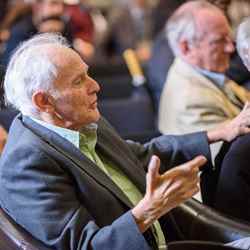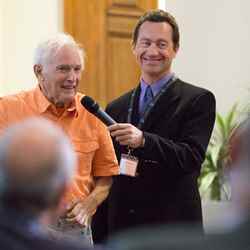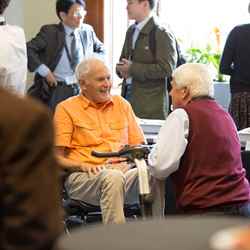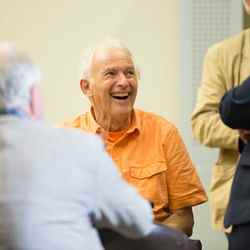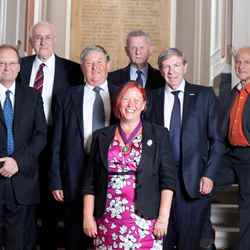Paying tribute to Harry Kroto
Words: Edwin Silvester, news and media manager at the Royal Society of Chemistry.
It’s been a sad week for science, and especially for all connected to the Royal Society of Chemistry, learning as we have of the death of our former president, the Nobel Laureate Professor Sir Harold Kroto.
I was lucky enough to meet him, firstly at an event in the summer of 2013, while helping Chemistry World's Ben Valsler to interview a number of our past presidents, who had gathered at Burlington House. Dressed in one of his customary brightly-coloured shirts (a burnt orange number if memory serves), Harry strode into the Hinshelwood room – "Hi, Harry Kroto", he said, smiling broadly and proffering a hand.
Many of the tributes to Harry, paid from around the world through the wonders of social media, bear out my first impression of him. I’ve read very many comments like "I will never forget his enthusiasm" and "He was very much involved with contributing to help new generations of chemists. A brilliant man and a good person".
Harry inspired people, especially students, not just with his chemistry, but with his insights on the world around him.
Lesley Yellowlees, our former president and professor of inorganic electrochemistry at the University of Edinburgh, told the Guardian: "Harry was an inspirational scientist who engaged with experts and non-experts alike. He motivated generations of would-be scientists through his tireless work with schools, clubs, science museums and festivals, both online and in person.
“He was the most approachable of men – full of entertaining tales about the wonders of the fullerenes but also about the rigours of scientific endeavour and the importance of good training. His enthusiasm and infectious grin will be sorely missed.”
The Guardian have also penned a full-length obituary to Harry, which gives a fascinating insight into his many influences and experiences, from early childhood in Cambridgeshire to professorship in the United States.
Harry’s commitment to and involvement with the Royal Society of Chemistry goes back many years. Robert Parker, now our chief executive, worked in our publishing wing when Harry was president from 2002-2004.
An ambassador for chemistry
Robert says: "I’ve always been struck by Harry's genuine passion for chemistry, which he shared so generously with young people and early-career researchers especially. He had an easy-going style which made him so approachable and such a good communicator and ambassador for chemistry.
"While he was clearly a brilliant scientist, it wasn’t his only passion and his abiding interest in art and design filtered through to influence in innovative journal covers and finding new ways to approach big problems. His warm-hearted nature, authentic interest in people and deeply-held personal opinions will be missed.”
Our deputy chief executive, Helen Pain, also fondly remembers Harry’s tenure as president, saying: "Harry inspired people, especially students, not just with his chemistry, but with his insights on the world around him.
"He once said that he wished he could start his research career all over again so that he could ‘create beautiful images of molecules and show them at work so everyone can share in the vision’.”
Harry was diagnosed with a form of Motor Neurone Disease just a few months after I met him. He returned to Burlington House in the summer of 2015 for a celebration of the 30th anniversary of his work on C60 – or as he had the honour of naming it – Buckminsterfullerene.
Celebrating C60
Many of Harry’s colleagues, former students – and even some of his rivals in the search for C60 – gathered from around the world to join him. Photos of the two-day celebration show Harry in full swing, beaming as he spoke to hundreds of different people, his wife Margaret by his side, as she has been for 53 years.
There have been many more obituaries paying homage to Harry, from his first university in Sheffield, to Sussex (where he did his Nobel Prize-winning work) and in the press, from the Telegraph in the UK to the New York Times in the USA, as well as El Pais in Spain.
The BBC’s science correspondent, Pallab Ghosh, has written a tribute to Harry on the BBC website, using Anne Perkiss’ lovely photos from Harry’s time at Sussex. Pallab also complimented our Chemistry World colleague, Ben Valsler, on a video recording the testimonies of many of Harry’s friends and collaborators over the years.
Pallab said: "It's a great video - a fitting tribute to a giant of science and a lovely man".
Press office
- Tel:
- +44 (0) 20 7440 3351
- Email:
- Send us an email

